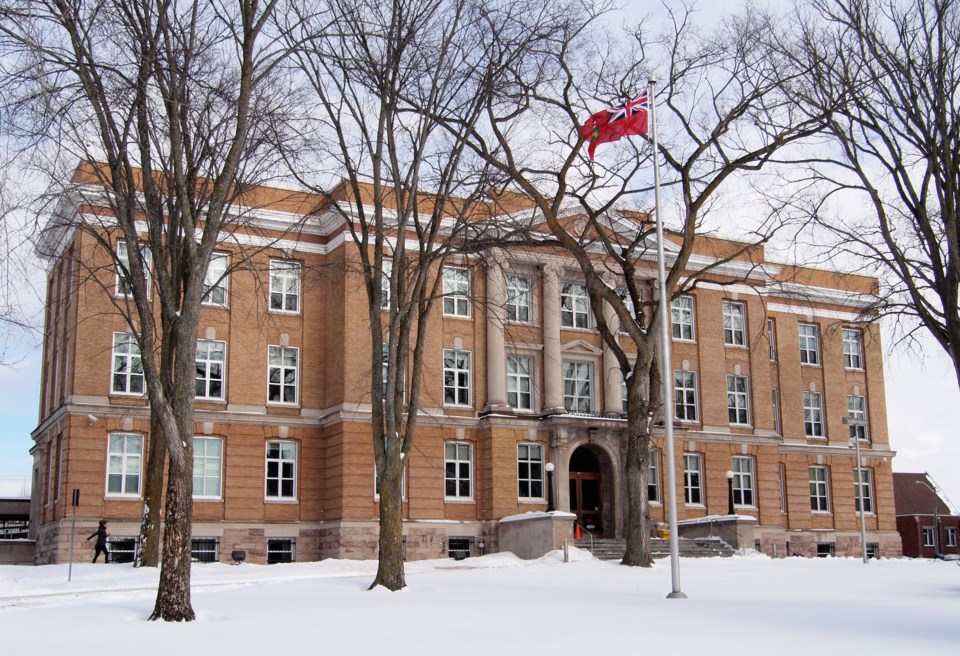Brad Southwind was in a psychotic state when he repeatedly stabbed and killed his best friend five years ago in a marshy wooded area behind their Elliot Lake apartment building.
The 28-year-old's drug use exacerbated his actions that day, a judge heard last week during his first-degree murder trial in the death of Joseph Topping.
Southwind was back in a Sault Ste. Marie courtroom for his second trial in connection with the 31-year-old man's death.
Topping's body was located on Feb. 14, 2018, a month after his mother had reported him missing.
His death occurred sometime between Dec. 28, 2017 and when police discovered his remains.
Officers with the Ontario Provincial Police charged Southwind with murder in August 2018.
The accused's first trial before a jury in July 2022 ended in a mistrial, resulting in his return to again face the charge before another Superior Court judge — without a jury.
Justice Michael Varpio heard from a forensic psychiatrist, who testified about his interactions with the accused that began in December 2018.
Dr. Jeffrey Van Impe met with Southwind several times at Waypoint Centre for Mental Health Care in Penetanguishene.
He was conducting a court-ordered assessment to determine if Southwind was Not Criminally Responsible (NCR) and if he was fit to stand trial.
Van Impe found the accused wasn't NCR and was able to stand trial on the charge of first-degree murder.
He based this determination on his discussions with Southwind, the accused's medical and clinical records, various witness statements, information from family members, his criminal record, as well as records from the time he was in custody at the Algoma Treatment and Remand Centre.
Van Impe also reviewed an August 2018 interview with an OPP interrogator where
Southwind admitted killing the victim with a 10-inch knife.
He told the officer "we were doing all kinds of drugs" and outlined his mental health struggles, indicating he suffers from schizophrenia and "I was off my meds."
Jurors at Southwind's first trial never heard from the psychiatrist.
Van Impe appeared via Zoom in the Sault courtroom, the only witness called by defence lawyer Anthony Orazietti.
Testifying as an expert in forensic psychiatry, he told Varpio that the accused was in a psychotic state at the time of the incident, wasn't taking medications prescribed to treat his schizophrenia and was heavily abusing illicit drugs, particularly crystal meth.
Southwind was "very intoxicated," hallucinating and delusional.
He believed Topping could read his mind and was telling him telepathically that he wanted to die.
During his interviews with Van Impe, the accused said both men were using drugs, indicating he likely had taken a combination of uppers, like crystal meth and crack cocaine, and downers such as cannabis and Percocet.
"I'd say I was pretty f----d up," he told the psychiatrist.
Orazietti asked Van Impe if his client had not used this cocktail of drugs, would this have happened.
"In my opinion likely not," he responded.
On Tuesday, Varpio heard closing arguments from the defence and Crown lawyers.
Referring to the doctor's testimony, Donald Orazietti described his client as "a very sick individual" who suffers from a major mental illness and was in a psychotic state when he killed Topping.
Southwind was off his medications, hearing voices, hallucinating, and delusional — "things that were not real," Orazietti said.
In this psychotic state, which was significantly affected by his substance abuse, he had minimum insight and believed what he was doing was okay.
In Van Impe's opinion, Southwind's decision making was impaired, and but for his intoxication this likely wouldn't have occurred.
The defence argued that as a result of his psychiatric state, Southwind was unable to form the specific intent to meet the threshold of first- or second-degree murder.
His client's mental illness "takes this matter to manslaughter," Orazietti told the court.
In a written argument, the Crown countered that Southwind intentionally caused Topping's death and his actions were planned and deliberate.
Prosecutor David Didiodato noted the psychiatrist's opinion that substance abuse had either caused or significantly accentuated any psychotic symptoms Southwind was experiencing.
Despite suffering from these symptoms, the accused clearly foresaw the consequences of his actions, Van Impe indicated.
Southwind "knew he was stabbing the victim and that his actions would cause the victim to die," he said, adding he has no doubt that Southwind appreciated that what he was doing "ran counter to the law and was legally wrong."
The Crown argued Southwind had a specific intent to kill his friend.
Despite the evidence of intoxication or any mental health issues there's no question, based on the nature of the attack — 17 wounds that included strikes to vital parts of Topping's body — that it can be inferred that Southwind intended to kill him.
There was evidence that the accused took a knife with him when the men went on their walk and also brought coins to put on the victim's eyes as part of a death ritual.
Southwind described giving him pills "so he wouldn't feel it."
He also had a conversation with Topping about how he would go to jail for killing him, recounting that his friend told him "don't worry about it, you'll probably only get four months of house arrest."
As well, when Southwind heard the victim screaming, he thought he "would get attempted murder" and continued stabbing him.
The accused struck Topping 20 to 30 times "because he wouldn't stop moving."
These actions indicated Southwind was considering the consequences and "engaging in intentional behaviour," Van Impe noted.
When considering all this evidence, there's no question Southwind foresaw the obvious consequences of his actions, Didiodato maintained.
"The assault on Mr. Topping was horrific, violent and unrelenting."
At the very least, the accused is guilty of second-degree murder, the Crown argued.
Varpio put the matter over to Wednesday of this week to set a date for his decision.
"Obviously, this will be an involved decision," the judge said.
